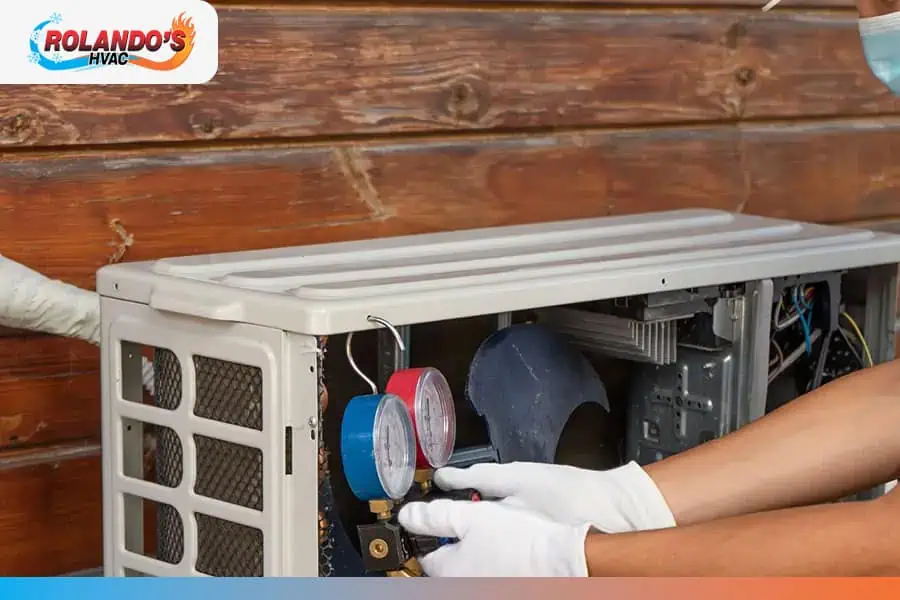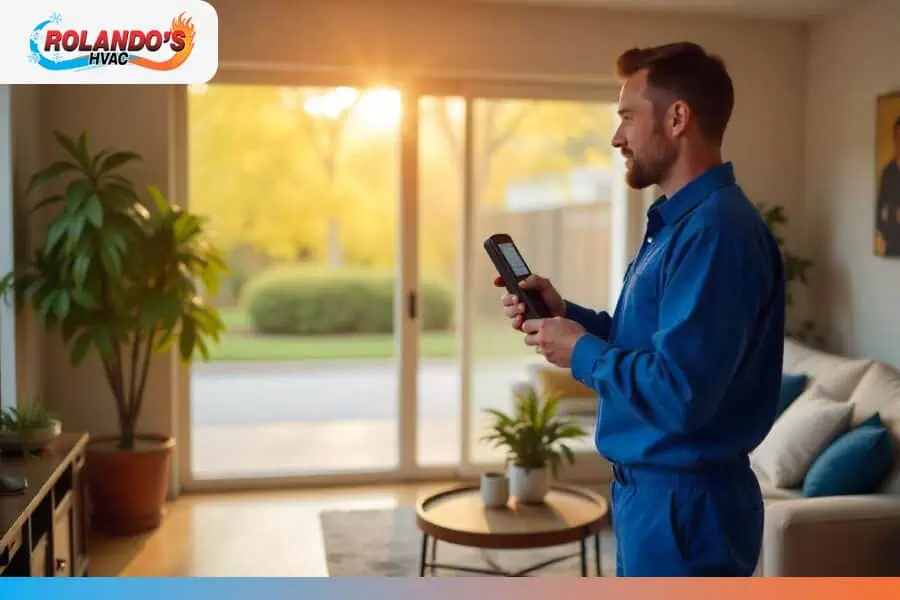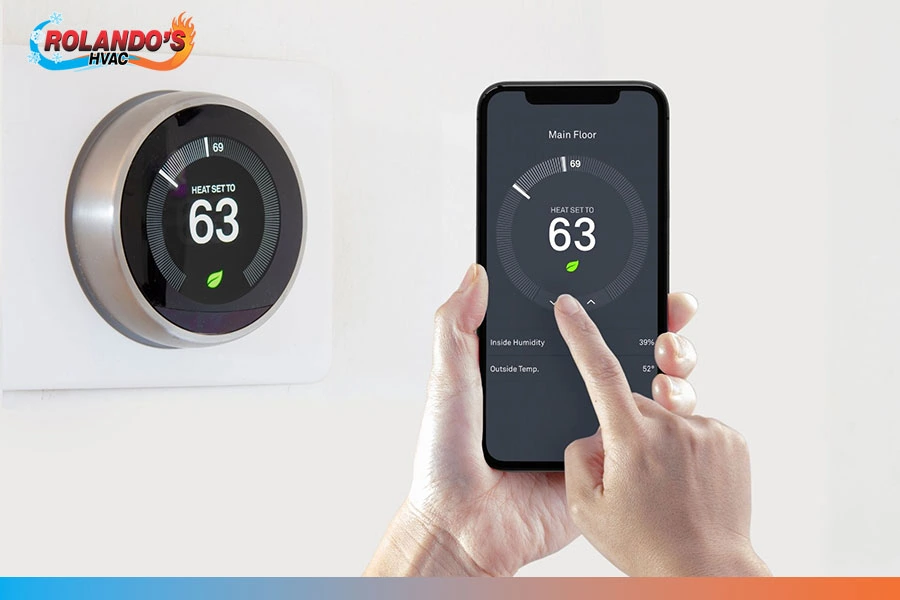
January 2, 2024
Indoor Air Quality: Symptoms of Poor IAQ and How to Improve It
Concerned about indoor air pollution but unsure if it's affecting your home? You're not alone. Many homeowners are oblivious to the potential dangers hiding both inside and outside their walls. Both indoor air quality (IAQ) and outdoor air quality (OAQ) can contribute to a host of health problems, including respiratory issues, allergies, headaches, and even cardiovascular disease.
Take a moment to breathe deeply (and hope it's clean air!). There are ways to assess and boost your home's IAQ, and our HVAC repair team is here to help. In this blog, we'll look at the unmistakable signs of poor IAQ, the significant impact it can have on your health, and actionable steps you can take to improve the air quality in your home.
Are you ready to create a healthier and more comfortable environment for yourself and your family? Let's dive into it
Symptoms of Poor Indoor Air Quality
Your home should be a haven of comfort and well-being. Unfortunately, indoor air pollution can turn your haven into a health hazard. Here are some key signs that your indoor air quality might be suffering:
Feels Too Humid In the Air Conditioned Area
While air conditioning removes heat, it can also increase humidity levels. Excessive humidity can lead to mold growth, which can trigger allergies and respiratory issues. You might also notice condensation on windows and surfaces.
Drastic Air Temperature Differences
Uneven temperatures within your home can indicate poor air circulation. This can lead to hot and cold spots, making it difficult to find a comfortable temperature. It can also suggest insufficient insulation or ductwork issues.
AC is Blowing at Unnecessarily High Speeds
If your AC seems to be working overtime or blowing at high speeds constantly, it might be struggling to reach desired temperatures due to inadequate airflow. This can increase energy consumption and wear and tear on your system.
Unpleasant Odors Coming from Air Ducts
Musty or stale odors coming from your air vents are a red flag. It can indicate the presence of mold, mildew, dust, or other contaminants in your ductwork. These pollutants can be harmful to your health and should be addressed promptly.
Health Issues Are Common Among Occupants
If you or your family members experience recurring allergies, headaches, respiratory problems, or other health issues, it could be related to IAQ problems. These symptoms can be triggered by various indoor air pollutants like dust mites, pet dander, and volatile organic compounds (VOCs) emitted from household products.
Don't ignore these signs! If you suspect you have poor indoor air quality, it's essential to take action. Contact Rolando's HVAC for a comprehensive inspection and diagnosis. We can help you identify the source of the problem and implement effective solutions to improve your indoor air quality and create a healthier and more comfortable environment for everyone in your home.

Causes of Indoor Air Quality
Unfortunately, many factors can contribute to poor indoor air quality, creating a less comfortable and potentially harmful environment. Here are some common culprits:
Combustion Appliances
Fuel-burning appliances like gas stoves, fireplaces, and heaters release harmful pollutants like carbon monoxide, nitrogen dioxide, and particulate matter into the air. These pollutants can irritate the respiratory system, worsen allergies and asthma, and even increase the risk of lung cancer.
Mold and Mildew
Moisture buildup can lead to the growth of mold and mildew, which can release spores into the air. These spores can trigger allergic reactions, respiratory problems, and even infections.
Dust and Dust Mites
Dust mites are microscopic insects that thrive in warm, humid indoor environments. They feed on dead skin cells and can trigger allergic reactions and asthma attacks.
Volatile Organic Compounds (VOCs)
VOCs are chemicals emitted from a variety of sources like paints, cleaning products, furniture, and air fresheners. These chemicals can irritate the eyes, nose, and throat, and some may even cause cancer.
Poor Ventilation System
Without proper ventilation systems, pollutants from outside air can become trapped indoors, carrying indoor air pollutants and leading to poor air quality. This is especially common in energy-efficient homes, where windows are often sealed tightly.
Pet Dander
Pet dander, which is made up of tiny flakes of skin shed by animals, can trigger allergic reactions and asthma attacks.
Secondhand Smoke
Secondhand smoke contains a variety of harmful chemicals that can cause cancer, heart disease, and respiratory problems.
Radon
Radon is a naturally occurring radioactive gas that can seep into homes through cracks in the foundation. It is the second leading cause of lung cancer in the United States. While radon can be present inside homes, it is also important to be aware of outdoor air pollution, which can also significantly impact health.
Being aware of these potential causes is the first step to improving your indoor air quality. By taking steps to address these issues, you can create a healthier and more comfortable indoor environment for yourself and your family.
How to Improve Indoor Air Quality in Your Home
Indoor air quality (IAQ) significantly impacts our health and well-being. Unfortunately, many factors can contribute to poor IAQ, including dust, mold, pet dander, and volatile organic compounds (VOCs) emitted from household chemicals. Luckily, several simple steps can help improve your home's IAQ and create a healthier environment:
Increase Air Circulation
- Open windows and doors regularly: This allows fresh air to circulate and remove harmful pollutants. Aim for at least 20 minutes of natural ventilation daily.
- Use fans: Ceiling fans and portable fans can help circulate air throughout your home, reducing stagnant areas and improving indoor air quality.
- Install exhaust fans: Kitchens and bathrooms should have exhaust fans to remove cooking fumes and moisture, which can contribute to mold growth and poor air quality.
Check Your HVAC Filters
Your HVAC system's filters play a vital role in keeping your indoor air clean. They trap dust, pollen, pet dander, and other airborne pollutants. It's important to check your filters regularly and replace them according to the manufacturer's instructions. Dirty filters can restrict airflow, reduce your system's efficiency, and contribute to poor indoor air quality.
Schedule Regular Maintenance for Your HVAC System
Regular maintenance by a qualified technician ensures your HVAC system is operating properly and efficiently. This includes cleaning the air ducts, coils, and other components, as well as checking for leaks and potential problems. Consider signing up for an annual maintenance program from Rolando's HVAC for peace of mind and optimal air quality.
Invest in HVAC Indoor Air Quality Products
Several HVAC products can help improve your indoor air quality:
a) Humidifiers
In dry climates, humidifiers add moisture to the air, which can help prevent respiratory problems and skin irritation. Choose a cool-mist humidifier to avoid the risk of mold or bacteria growth.
b) Dehumidifiers
In humid climates, dehumidifiers remove excess moisture from the air, preventing mold growth and musty odors. This is especially important in areas like basements and crawl spaces. air handling systems.
c) Air Purifiers
Air purifiers remove harmful pollutants from the air, such as dust, allergens, pet dander, and smoke. Consider investing in a HEPA air purifier for optimal filtration efficiency.
By implementing these simple yet effective strategies, you can significantly improve the air quality in your home and create a healthier environment for your family. Don't hesitate to contact Rolando's HVAC for expert advice and assistance in optimizing your indoor air quality. We offer a wide range of solutions to meet your specific needs and ensure you breathe clean, healthy air in your home.
Keeping Your Home Safe and Comfortable with Rolando's HVAC
Florida's unrelenting heat makes a fully operational AC unit an absolute necessity. However, understanding the multifaceted factors that influence AC repair costs is the first step in gaining control over your expenses and maintaining a cool and comfortable living environment in the Sunshine State. By delving into these factors and implementing proactive measures to preserve your system, you can effectively manage and even reduce potential repair costs, ensuring your peace of mind during Florida's scorching summers.

Rolando’s HVAC











